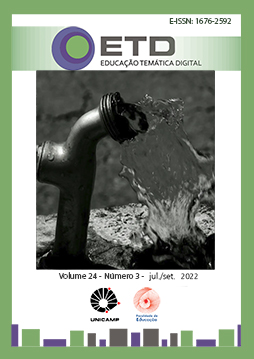Abstract
The growth of tourist activities in several places around the world motivates the search for training and education in tourism with a focus on the performance in the various sectors offered in the labor market. In this sense, in the field of formal studies, Brazil currently has a large offer of higher education courses that contribute to the training and education of professionals in tourism, including the ones offered at the Federal Institutes of Education. It is understood that the education in these institutions, based on the principles of Professional and Technological Education (EPT), allows the academic education of a graduate in whose professional profile is also present the elements of EPT. This paper presents a part of a research that aimed to identify the concepts of Integrated Curriculum present in the Pedagogical Project (PPC) of the Tourism Management Course offered by Farroupilha Federal Institute, a document that guides the pedagogical structure and practices developed in the course. It is a qualitative exploratory research. The results of the analysis indicate that the discourse presented in the structure of the PPC is in accord with the principles of EPT. However, when looking for the course objectives and the professional profile of the graduates in the same document, the elements found are insignificant considering what it proposes. It is also evident that there is a greater concern with questions related to the proposition of methodologies with a view to the development of curricular integration than with the reflection on what curriculum integration.
References
ANDRIA, Joseph; DI TOLLO, Giacomo; PESENTI, Raffaele. Detection of local tourism systems by threshold accepting. Comput Manag Sci, v. 12, n. 4, p. 559–575, 2015.
ARAUJO, Ronaldo Marcos de Lima; FRIGOTTO, Gaudêncio. Práticas pedagógicas e ensino integrado. Revista Educação em Questão, v. 52, n. 38, p. 61-80, 2015.
BRASIL. Ministério da Educação. Conselho Nacional de Educação. CNE/CP 13/2006, de 24 de novembro de 2006. Institui as Diretrizes Curriculares Nacionais do Curso de Graduação em Turismo. Brasília, DF: MEC, 2006. Disponível em: http://portal.mec.gov.br/cne/arquivos/pdf/rces13_06.pdf. Acesso em: 29 out. 2020.
BRASIL. Ministério da Educação. Secretaria de Educação Profissional e Tecnológica. Catálogo Nacional de Cursos Superiores de Tecnologia. Brasília: MEC, 2010. 73 p. Disponível em: http://portal.mec.gov.br/index.php?option=com_docman&view=download&alias=7237-catalogo-nacioanl-cursos-superiores-tecnologia-2010&category_slug=dezembro-2010-pdf&Itemid=30192. Acesso em: 29 out. 2020
BRASIL. Ministério da Educação. Secretaria de Educação Profissional e Tecnológica. Educação profissional técnica de nível médio integrada ao ensino médio: documento base. Brasília, DF: MEC, 2007. Disponível em: http://portal.mec.gov.br/setec/arquivos/pdf/documento_base.pdf. Acesso em: 4 nov. 2020.
CARVALHO, Géssika Cecília. Concepções docentes sobre ensino médio integrado no Instituto Federal de Alagoas. Trabalho & Educação, v. 29, n. 2, p. 169-182, 2020.
ESTEVÃO, Cristina; NUNES, Sara. Fatores de competitividade turística: A área regional de turismo do Algarve. Pasos: Revista de Turismo y Patrimonio Cultural, v. 13, n. 4, p. 897-912, 2015.
FREIRE, Paulo. Pedagogia do oprimido. 17. ed. Rio de Janeiro: Paz e Terra, 1987.
INSTITUTO FEDERAL FARROUPILHA. Plano de Desenvolvimento Institucional 2014-2018. Santa Maria: IFFar, 2014. Disponível em: http://www.iffarroupilha.edu.br/site/midias/arquivos/201481613481811plano_de_desenvolvimento_institucional_2014-2018.pdf. Acesso em: 09 nov. 2020.
INSTITUTO FEDERAL FARROUPILHA. Projeto Pedagógico do Curso Superior de Tecnologia em Gestão de Turismo. Santa Maria: IFFar, 2017. Disponível em: https://www.iffarroupilha.edu.br/projeto-pedag%c3%b3gico-de-curso/campus-s%c3%a3o-borja. Acesso em: 15 out. 2020.
LUNARDI, R. et al. A educação técnica profissional e a prestação de serviços em turismo: uma análise a partir dos cursos técnicos do Instituto Federal de Educação Ciência e Tecnologia Farroupilha (RS, Brasil). Revista Turismo & Desenvolvimento, n. 27/28, p. 259-262, 2017.
MARQUES, Waldemar; DARN, Telma; IMAMURA, Mariana. O profissional do Turismo–formação superior e trabalho (The Tourism professional–higher education and work). Revista Eletrônica de Educação, v. 12, n. 2, p. 336-344, 2018.
ORGANIZAÇÃO MUNDIAL DO TURISMO - OMT. Desenvolvimento de turismo sustentável: manual para organizadores locais. Madrid: Organización Mundial del Turismo, 1994.
OVIEDO-GARCÍA, M. Angeles. Tourism research quality: Reviewing and assessing interdisciplinarity. Tourism Management, n. 52, p. 586 – 592, 2016.
PACHECO, Eliezer (Org.). Institutos Federais: uma revolução na educação profissional e tecnológica. São Paulo: Moderna, 2011.
PIMENTEL, Thiago Duarte; DE PAULA, Sara Conceição. A inserção profissional no mercado de trabalho face às habilidades adquiridas na formação superior em turismo. Revista de Turismo Contemporâneo, Natal, v. 2, n. 1, p. 49-73, 2014. Disponível em: https://periodicos.ufrn.br/turismocontemporaneo/article/view/5474/4454. Acesso em: 14 nov. 2020.
RAMOS, M. Concepção do ensino médio integrado. Versão ampliada de exposição no seminário sobre ensino médio. 2007. Disponível em: http://forumeja.org.br/go/sites/forumeja.org.br.go- /files/concepcao_do_ensino_medio_integrado5.pdf. Acesso em: 29 set. 2020.
SILVA, Luana; HOLANDA, Luciana de Araújo; LEAL, Sérgio Rodrigues. Inserção dos turismólogos brasileiros no mercado de trabalho. Revista Turismo em Análise, v. 29, n. 3, p. 506-524, 2018.
SILVA, Aline Ribeiro; MOTA, Keila Cristina Nicolau. Competências para o mercado de trabalho em turismo e hotelaria: Perfil dos profissionais requerido em Fortaleza. Conexões-Ciência e Tecnologia, v. 7, n. 1, 9-30, 2013. Disponível em: https://doi.org/10.21439/conexoes.v7i1.541. Acesso em: 30 set. 2020.
SILVEIRA, Carlos Eduardo; MEDAGLIA, Juliana; NAKATANI, Marcia Shizue Massukado. O mercado de trabalho dos egressos de cursos superiores em turismo: comparações dos dados de 2012-2018. Revista Brasileira de Pesquisa em Turismo, v. 14, n. 2, p. 83-94, 2020.
TASCA, Ingrid Kerlin. Currículo integrado e as produções discursivas dos projetos pedagógicos no contexto do ensino médio integrado. 2020. Dissertação (Mestrado em Educação) - Programa de Pós-Graduação em Educação Profissional e Tecnológica – ProfEPT. Instituto Federal de Educação, Ciência e Tecnologia Farroupilha, Jaguari, 2020.
WEBSTER, Craig; IVANOV Stanislav. Transforming competitiveness into economic benefits: does tourism stimulate economic growth in more competitive destinations? Tourism Management, n. 40, 137 – 140, 2014.

This work is licensed under a Creative Commons Attribution-NonCommercial-NoDerivatives 4.0 International License.
Copyright (c) 2022 ETD - Educação Temática Digital


